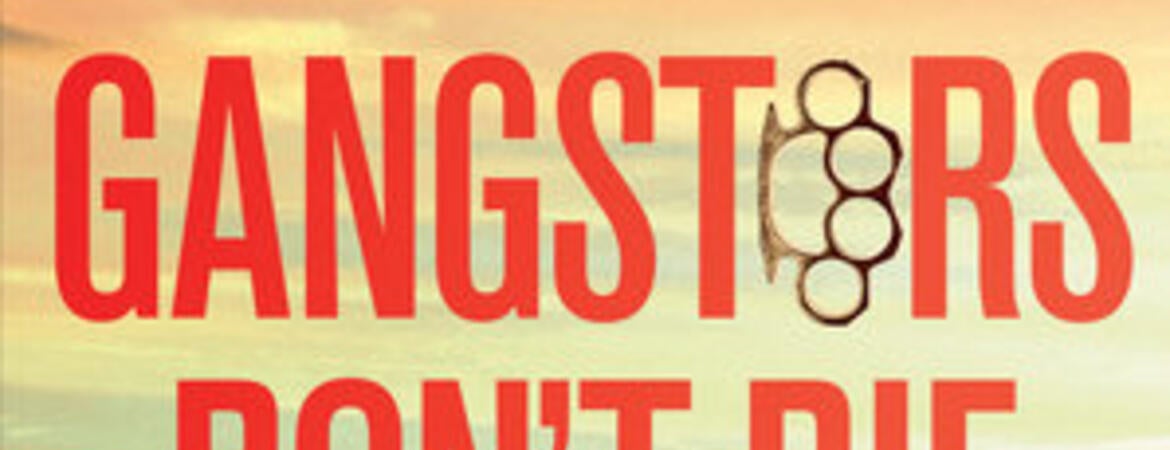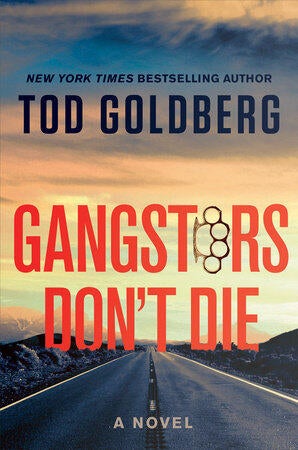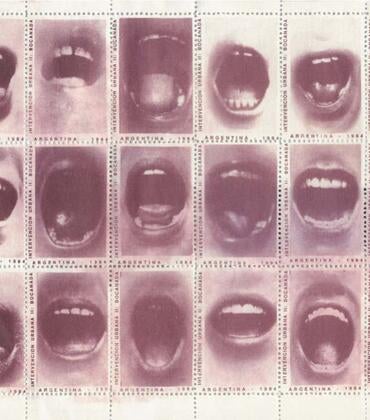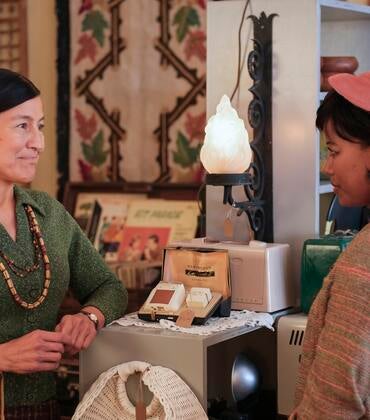
Tod Goldberg’s imaginary world is full of criminals and con men. It’s been that way since he first learned to read.
For decades this author of 14 published books has been able to create plots, characters, and circumstances so real that readers often can’t discern fact from fiction. Such is the case in his most recent publication, “Gangsters Don’t Die” (Counterpoint Press, 2023), the last of Goldberg’s trilogy of crime novels.
Goldberg, a professor of creative writing and director of the UCR Palm Desert low-residency MFA program, is on a national book tour, making several stops in Southern California, including Riverside, Pasadena, and Ventura.
His passion for writing crime novels has two simple, personal explanations, he said.
“My adult reason is that crime fiction hangs a mirror up to society and forces you to look into it, into the larger ills in society. It also allows me to explore things I’m afraid of,” said Goldberg, who was diagnosed with dyslexia as a kid and learned to read at age 10. He was once told by doctors he wouldn’t read or write beyond the fourth-grade level. “The other reason comes from when I was a kid. I read crime books, including those by Elmore Leonard and Robert B. Parker. My young education was about hitmen, mobsters. That’s what I grew up reading.”
As a 10-year-old boy, reading suspense, thriller, and crime novels allowed Goldberg to step away from what he perceived as his own chaotic world, and dive into one that punished bad people or offered an out to the not-so-bad ones.
“The thing about great crime fiction … is that it brought me into a chaotic world that at the end had a solution. That’s a big part of the genre, it brings order to chaos. I found comfort in that,” said Goldberg, whose older brother, Lee Goldberg, is also a crime novelist who introduced the young Goldberg to crime novels.
On November 5 the brothers will appear at UCR ARTS in downtown Riverside in conversation with Susan Straight, UCR distinguished professor of creative writing.
“Gangsters Don’t Die” characters, such as the mafia hit-man-turned-rabbi Sal Cupertine, his wife, Jennifer, and their son William, face different destinies — their futures forged like self-inflicted wounds. In Goldberg’s con men world, nobody gets away without facing some type of consequence.
Goldberg’s characters are also very much human. Making them relatable and allowing them to vacillate with fate and jump between the reality of their world and the world they desire, is as real as life it gets, Goldberg said.
Such is true for Sal Cupertine — who hides from enemies and the FBI — in the persona of Rabbi David Cohen. In his quest to hide the ill-spoken assassin he is, he found God. During an unexpected visit with an elder rabbi, David ends up in an intimate and beautiful baptismal ceremony that marks his new beginning, sealed with a Star of David gold chain around his neck. The baptism gave him the type of peace his disarranged life had buried for decades.
The last time he had felt that type of internal peace was seconds before he saw his father’s body fly out of a 52-story window. The body splattered on the cement, in front of him. David was a 10-year-old boy then, the memory of his father forever edged in his soul.
The book’s plot unravels over the course of a week, primarily in April — cleverly positioned in a month associated for new beginnings. Goldberg simultaneously sets characters in Palm Springs, Las Vegas, Washington, the Mojave Desert, and Utah. Stories in his past novels unfolded over a year or religious holidays. This time, he wanted to take readers on a faster journey, he said.
“For me, the joy of writing is the organic process of finding out, of knowing what the end is going to be and figuring out how I’m going to get there along the way,” Goldberg said.
Character creation and development is another reason Goldberg feels connected to the people in the novel. One of them is FBI agent Kristy Levine. This character is inspired by his late friend and very first fan, Kristy, who died from cancer. One day in real life, she was stopped by a Florida cop for driving 85 mph. She had just started chemotherapy and it was likely the last day she would feel the wind caressing her hair, she told the officer. Instead of a ticket, Kristy received a hug and words of encouragement from the cop. Kristy Levine is Goldberg’s way of is immortalizing his friend of 23 years and the details of that encounter with the police officer are included in the book.
Another personal connection in the novel is the newly found stories of his Jewish ancestors. As he created Rabbi David Cohen’s character, he knew he needed to give him roots, so Goldberg dug into his own unfamiliar ancestral history for inspiration. He discovered that after World War I, his paternal grandmother’s entire family had been assassinated in front of her. His maternal grandfather’s family barely escaped alive. This grandfather, David Barer, was smuggled inside a sack of potatoes while he held onto his infant brother, who succumbed during the journey.
The only constant, physical memory Goldberg has from grandpa Barer is his 1926 copy of “A Book of Jewish Thoughts.” It sits prominently on Goldberg’s office bookshelf.
Weaving these personal narratives with imaginary characters and places is an artform Goldberg wants to always share with Palm Desert low-residency MFA program participants. As the program’s director, sharing his own learnings and even his own shortcomings, allows for growth and better storytelling, he said.
“The thing about being a writer is that you are always improving and getting better at it. I always say, ‘Never be satisfied with the level you’ve reached. There’s always a better way to do it,’” Goldberg said. “I’ve never felt that I’ve made it. These four books are the best books I’ve ever written…but I’m always reaching for that next thing. Making art is never about complacency. As soon as you are complacent, you are irrelevant.”
“Gangsters Don’t Die” — Meet Tod Goldberg
Sunday, Nov. 5 at 1:30 p.m.
Tod Goldberg, “Gangsters Don’t Die” and Lee Goldberg, “Calico” and “Malibu Burning,” in conversation with Susan Straight, “Mecca”
In-person event with the Inlandia Institute
UCR ARTS, and the Barbara and Art Culver Center of the Arts
3834 Main St. in Riverside
Monday, Nov. 13 at 7 p.m.
Tod Goldberg, “Gangsters Don’t Die” in conversation with Lee Goldberg, “Calico” and “Malibu Burning”
Vroman’s Bookstore
695 E. Colorado Blvd. in Pasadena
Tuesday, Nov. 14 at 7 p.m.
Lee Goldberg, “Calico” and “Malibu Burning” in conversation with Tod Goldberg, “Gangsters Don’t Die”
Timbre Books
1910 E. Main St. in Ventura
Praise for “Gangsters Don’t Die”
“Goldberg is charming and sharp, with a quip for every occasion . . . Although each book stands on its own, taken together, the Gangsterland novels read like a single sweeping story with a large cast and numerous storylines, which Goldberg compares to the slow-developing character arc over the course of several seasons of shows like Game of Thrones and The Wire. This gave Goldberg a great deal of latitude to tell the story in an emotionally satisfying way . . . Goldberg’s success in this anti-heroic mode is rare in the world of crime fiction. Where many writers emphasize the violence in their stories, Goldberg pays equal attention to its psychic aftermath.” —Jim Ruland, Los Angeles Times
“End¬less¬ly enter¬tain¬ing . . . Gang¬sters Don’t Die is an authen¬tic, ful¬ly real¬ized, mod¬ern-day noir thriller. For read¬ers who want excite¬ment but don’t want to skip out on char¬ac¬ter devel¬op¬ment and inte¬ri¬or¬i¬ty, this book is a great choice. —Benjamin Selesnick, Jewish Book Council
“Goldberg’s Gangsterland series has been one of the standouts in the world of crime fiction in recent years, and now the trilogy is coming to a conclusion with the publication of Gangsters Don’t Die. Sal Cupertino, the hit man on the lam, posing as a rabbi, is one of the more original figures you’ll come across, and now he’s making one last desperate gambit to get his life back. You won’t want to miss these books, so if you haven’t already, brush up on your Goldberg.”—Dwyer Murphy, CrimeReads
“A mesmerizing comic noir that’s fully accessible to series newcomers . . . This is a stellar end to one of the most inventive crime series in recent memory.” —Publishers Weekly (starred review)
“There’s a machine gun in this book, the rat-a-tat-tat prose that punches page after page—but don’t let it fool you, there’s also true wisdom in here. In the midst of the mobsters, rabbis, shysters, Springsteen, and of course the Torah, you will get an education—about family, about murder, and about having a code. Gangsters Don’t Die is delicious. Tod Goldberg is part-Chandler, part-shaman, and all-killer.” —Brad Meltzer, bestselling author of "The Lightning Rod"
“Tod Goldberg concludes his smart, irreverent, and bloody Gangsterland trilogy with a bang. Gangsters Don't Die is a tour-de-force that is witty, violent, and brilliantly observed. With these three novels, Goldberg has forever changed the crime genre for the better—elevating it with unforgettable characters, humor, and style to spare. I didn't want it to end.” —Ivy Pochoda, author of "Sing Her Down"
“Gangsters Don't Die is a highwire act of plot and character, filled with criminals whose deadpan sense of humor and willingness to kill for family, always for family, exists alongside the voice of Sal Cupertine, hitman turned rabbi, offering advice on belief and loyalty through the sage counsel of the Talmud. I found myself thinking all day about families, and love, at the heart of a thriller with the most inventive ways to describe killing I've read in a long, long time. Just stunning.” —Susan Straight, author of "Mecca" and "In the Country of Women"





